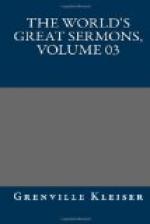Let me request you to consider seriously how you stand disposed to the exercises of religion. If God is the object of your love, you will gladly avail yourselves of the most favorable opportunities of cultivating a closer friendship with the Father of your spirits: on the contrary, he who feels no regard for these opportunities, proves that he has no love to God, and will never be able to establish the conviction that God is his friend. Wherever there exists a sincere friendship, opportunities of cultivating it are gladly embraced, and the opposite privations are regretted. Where a habitual neglect of sacred exercises prevails it must be interpreted as if it said, like those whom the prophet describes, “Cause the Holy One of Israel to cease from amongst us. Depart from us, for we desire not the knowledge of thy way!” If your closets seldom witness your private devotions, if your moments in retirement are languid and uninteresting—your religion can have no hold on your heart; and the reason why your religion has no hold on your heart is because you have no love of God. There are some whose religion sits easy and delightful upon them; its acts and functions are free and lively: there are others who seem to bear their religion as a burden, to drag their duties as a chain—as no vital part of themselves, but rather a cumbrous appendage: this is a decisive and melancholy symptom of a heart alienated from God. There is no genuine religion, no real contact of the heart with the best of beings, unless it makes us continually resort to Him as our chief joy. The psalmist is always expressing his fervent desires after God: after the light of the divine countenance, and the sense of the divine favor: but do you suppose such desires peculiar to the state of believers under the Old Testament? No, my brethren; there exist more abundant reasons than ever, since the gospel of Christ has been displayed in all the glorious fulness of its blessings, why our souls should be inflamed with such feelings as those which inspired the psalmist, when he exclaimed, “As the hart panteth for the water-brooks, so longeth my soul after thee, O God!”
If you would ascertain whether you love God, consider how you stand affected toward the Word of God. We can entertain no just thoughts of God, but such as we derive from His own Word: we can acquire no true knowledge of God, nor cherish any suitable affections toward Him, unless they are such as His own revelation authorizes. Otherwise we must suppose that revelation insufficient for its specific




